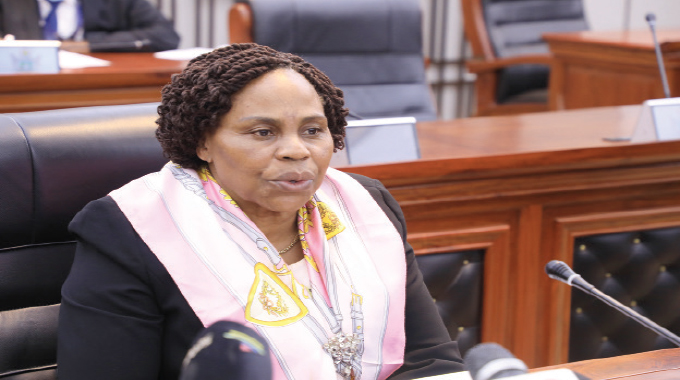
The Sunday News

Leroy Dzenga, Harare Bureau
THE past week, the weather was at its unpredictable worst. It was occasionally hot, temperatures would drop and there were episodes of rain.
Despite the wardrobe inconvenience the situation brought, the implications of the changing weather patterns extend as far as national planning.
Government has had to plan the 2022 Summer Cropping season early, so as to sufficiently react to the new climatic conditions.
Information, Publicity and Broadcasting Services Minister Monica Mutsvangwa announced in her post-Cabinet media briefing last Tuesday that Government hopes that time allows them to navigate the uncertainty.
“With a view to ensuring household and national food security, the update on preparations for the 2022/2023 summer agricultural season have been brought forward from August to April, in order to deal with the perennial challenges around food security in the country,” said Minister Mutsvangwa.
The world finds itself in a precarious condition, no one is guaranteed food security. This is a result of the ongoing Covid-19 pandemic, climate change and geo-political conflicts which have disrupted global value chains — pushing prices up.
Zimbabwe has already started putting together contingencies to ensure that the food production disruptions experienced in the 2021/2022 season do not repeat.

Prof Amon Murwira
“In view of the need to mitigate the threat posed by dry spells at critical stages of crop development, Cabinet directed that Falcon Air, which is owned by the District Development Fund, be capacitated to conduct cloud seeding at appropriate times,” said Minister Mutsvangwa.
Zimbabwe’s decisions have been fully informed by science, perhaps the first major utilisation of the Zimbabwe National Geospatial and Agency (ZINGSA). In 2020, Government instructed ZINGSA to do research to inform the Revision of Zimbabwe’s Agro-ecological Zones.
Higher and Tertiary Education, Innovation, Science and Technology Development Minister Professor Amon Murwira, said the report, which was adopted by Cabinet, found that seasons are changing.
In his own right, Professor Murwira is a Professor of Aerospace Earth Observation, Satellite remote sensing, Geographic Information Science and Geospatial Intelligence.
“It is a fact that seasons have changed, it was confirmed in the research that led to the reorganisation of agro-ecological zones by Government,” said Professor Murwira.
The data, observed in the report done by State universities and the Meteorological Services, was from 1951 to 2017.
Institutions which contributed to the inquiry are Bindura University of Science Education, University of Zimbabwe, Chinhoyi University of Technology, Midlands State University and the Meteorological Services Department.
“It can be observed that the whole country has experienced a change in when the season begins. In fact, the greater part of the country now experiences a late start to the season by as much as 18 days while some regions experience an early start to the season,” the report reads.
The delays in rains are however, not uniform across the country and this can inform how extension officers frame their messages to farmers.
“Typical areas that have experienced a late start to the rainfall season include Mashonaland Central, Mashonaland East, Mashonaland West, Matabeleland North, northern parts of Midlands and the greater part of Manicaland. In contrast, Matabeleland South, Masvingo and southern parts of Matabeleland North have now shifted towards an early start to the rainfall season,” the report further reads.
The researchers found that shifts in Zimbabwe’s climatic conditions started as far back as the 1980s.
“1982 can be reasonably taken as the climate shift year for Zimbabwe in which rainfall and temperature shifted to a new regime.
Therefore, the epoch before 1982 is herein referred to as the pre-shift period while the era after 1982 is considered the post-shift period,” the report also states.
Zimbabwe had five agro-ecological regions which were mapped in 1960, but after the revision, they increased to seven.
However, despite having figured out that the seasons have changed, the data available is not enough for a pattern to be identified as the weather conditions remain erratic.
Professor Desmond Manatsa, the lead researcher in the research that saw the revision of agro-ecological zones, told our Harare Bureau that observing a shift in the rainy season is not the same as identifying the new patterns.
For there to be a veritable scientific on seasonal shifts, a period of over 30 years needs to have been placed under continuous study.
“Climate Change is altering the type of weather as we know it everywhere in the world and Zimbabwe is not spared.
That is why there was a deliberate exercise recently by Government to revisit the national agro-ecological regions.

Mr Paul Zakariya
If you look at the new agro ecological boundaries, you will note that the shifts are taking into consideration the changes in the intra-seasonal characteristics like onset and cessation of the season,” said Professor Manatsa.
Professor Manatsa revealed there is an emerging trend where rains are going beyond months they are usually expected to end, but it is still early days to make a plausible conclusion.
“As for the current season where the rains have prolonged to overlap into winter, it is a manifestation of the effects of the changing climate. Of course we have had seasons which had similar characteristics but they were very rare occasions. We may not rule out increased frequency of such prolonged rainfall seasons,” he pointed out.
Anxious farmers who are looking up to science for guidance on how to manage their seasons have to wait for longer, as there is need for more time to observe the changes — holding the present conditions constant.
“However it may not be enough to conclude changing our cropping season because climate change is also introducing more unpredictability than before. The seasons are becoming more chaotic and difficult to predict hence there is no clear pattern that we can attribute to the effects of climate change,” said Professor Manatsa.
He encouraged farmers to pursue innovative ways which make them less dependent on climatic conditions, as scientists try to make sense of what is obtaining.
“Normally a new climate of a region needs to be the average of at least 30 years, though 50 years are more preferable,” added Professor Manatsa.
This means there may not be clarity on the full understanding of the emerging climate perhaps until around 2047.
Farmers have been left in a precarious position where long term planning is nearly impossible, save for those who no longer rely on rains.
Zimbabwe Farmers Union (ZFU) executive director Mr Paul Zakariya said changes in weather patterns negatively affect farmers, who rely heavily on weather information.
“Sometimes it could be the seven to 10 day forecast. But there are times when the Meteorological Services Departments’ predictions do not come to pass and it puts farmers who would have planned around that in a difficult position,” said Mr Zakariya.
The variance between forecasts and how the weather sometimes unfolds has pushed some farmers to return to methods of the ancestors.
“Our farmers, especially those who are elderly are now relying on Indigenous Knowledge Systems.
They can foretell the weather by simply observing different things in the environment, this could be the direction the wind is blowing in, appearance of certain insects or the emergence of some traditional fruits which may be read as a signal for a tough rainy season,” explained Mr Zakariya.
In the past, it was a known gospel in farming that those who want to do dry planting will have to plant before the second week of October, which marked the onset of rains.
Even ZFU would give advisories to farmers which gave recommendations on planting times, but they have since refrained from being specific due to the unreliability of available data and volatile nature of the rains.
“It is now very tricky for the organisation to give specific planting dates for instance. If things do not turn out that way, people will cry foul. Climate change is real.
The MSD said there will be normal to above normal rains, but we experienced long dry spells in the middle of the season and now it is raining like we are in December,” said Mr Zakariya.
As they wait for science to be more profound, they have encouraged their members to also try and gather information that could help their decision making, at farm level to complement official forecasts.
“At the moment we are urging farmers to have basic equipment that informs them, like a rain gauge. That will allow them to measure the rains and make a decision.
There are still gaps, even when the MSD gives us updates, they say that the operative word is prediction, which means it may come to pass or may not come to pass and that does not inspire much confidence,” said Mr Zakariya.
Farmers have begun adjusting to the new agro-ecological regions, but as a product of instinct more than knowledge.
“To be honest, most farmers have not been adequately informed about the new regions. That is not to say they have not been shifting with the way the seasons have been unravelling. They have been doing so as a coping mechanism,” added Mr Zakariya.
He said some farmers are downsizing their operations, while some are changing crops, and others have been adopting irrigation.
Zimbabwe has an agriculture reliant economy and a significant part is yet to be irrigated.
This is why President Mnangagwa gave the Ministry of Lands, Agriculture, Fisheries, Water and Rural Development the year 2023 as a deadline to complete the national irrigation programme.
Zimbabwe needs to have 350 000 hectares under irrigation to eliminate grain imports and currently it has about 200 000 hectares covered.
As things stand, investing in irrigation appears a better guarantee of food security than trying to master the ever-changing rainy season.



